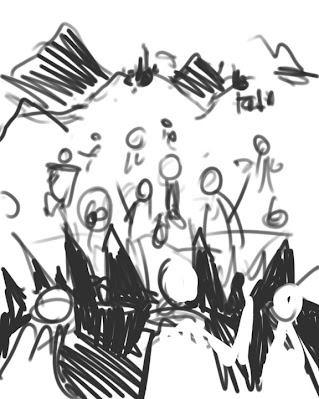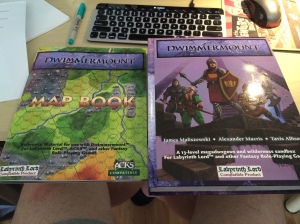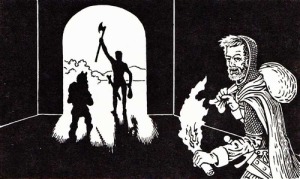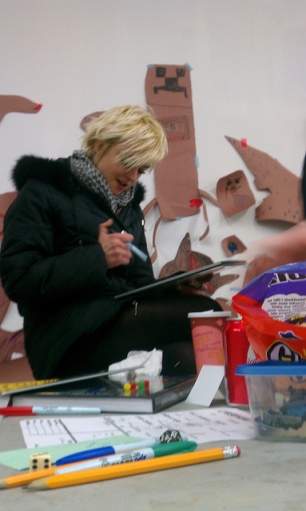As a blogger and a signatory to the Joesky Accords I have a responsibility to talk about play. As a publisher I need to let you know that if you want to back the Domains at War Kickstarter but haven’t yet, you should do so soon because it closes tomorrow, May 18th at 3:32 pm.
These may boil down to the same thing. I’m helping create Domains at War because I enjoy playing it. If you’re also excited about what having a wargame integrated with a RPG system for mass combat and strategic campaigns will mean for your gaming, your Kickstarter pledge is part of that process of creation. Sharing excitement about D@W is good for Autarch as a publisher because it’s in our interests for people to get into the games we make, and it’s good for me as a gamer to learn from what other people are doing with the systems I’m interested in.
You might not share either of these interests, but as a reader of blogs I often find something of value even in reading posts about games that I feel no urge to play. In the case of posts about publishing with Kickstarter, that game is Papers and Paychecks. Here are some of the system-neutral insights it’s generated.
To be a publisher, one should first be a corporation. This is the difference between rolling up a player character to go adventuring and actually descending into a hole filled with deadly traps while wearing your own skin. One of the foundational mistakes in the Dwimmermount Kickstarter was that James didn’t incorporate Grognardia Games. Happily, the potentially dire consequences of doing business as an individual have been averted in this case. We’ve managed to warp the ship off the shoals, but even if it’s wrecked on some other obstacle having Autarch at the helm will mean that all the casualties among the crew will be purely fictional entities.
It is interesting to be running a player character in real life, although usually not in the ways you’d think. Playing a role that’s made distinct from your own by the rules of the game or the laws governing corporate entities gives you the chance to act as if it is you and is not you. I think it comes down to protection from risk. Doing business as a company means that you can always roll up a new character if the current one gets killed, which leads to the same kind of exploration-based, consequence-embracing play we celebrate in games that don’t implicitly require that your guy will survive until the final act.
Autarch is actually more like a chartered adventuring party, and I think that the robustness that comes from making this the fundamental unit of play is as useful in other games as it is in Papers & Paychecks. Original D&D is the story of the world rather than the story of the characters who explore it, but making the party the recurring lens through which this takes place focuses the cumulative actions of the players and makes it easy to bring new actors into the story.
One of the cool things about roleplaying games is that they’re not just an outlet for your DIY creativity, but a chance to participate in the creativity of folks who have talents you don’t. My Night of the Walking Wet game at this year’s Gary Con introduced me to Fred Liner, who had one of the original pieces of Jonathan Bingham’s art that the Adventurer Conqueror King Kickstarter made possible. For Domains at War, Fred pledged for a backer reward that let him choose the subject of an illustration for the book. His description nods to the Walking Wet party in which Mark’s hobbit has a special ability that makes him always appear to be a member of a group of 14:
The foreground of the picture is a small command group with a banner the banner bearer is a dwarf, Snorri One-eye, one of his eyes is a glittering black orb in the hand not holding the banner he carries an axe, his helmet is made of lizard skin. The headpiece of the banner is similar to a roman standard with “The XIV”, the banner, if it can be made out, is a griffon on a white field. The other members of the command group are 2 mages and a cleric. One of the mages specializes in fire magic and the other is a dark, necromancer. To the left and in the background are a of couple siege engines. To the right the rest of the company is in the middle distance advancing on an earthworks. There are 8 figures in this group all soldier types with various weapons with one exception. One of figures in this group should be a scout type in leathers and a cloak that is swirling around him as the cloak transforms into smoke.
Here’s Ryan’s compositional sketches for this idea:



Here’s the final piece:

I find it fascinating to be part of this process in the same way I’m amazed by people in my gaming groups who can do more than one funny voice. Of course, Ryan has a more than professional level of talent, and some of the people I’ve gamed with actually get paid as actors. Still, the personal involvement – the fact that it’s my character’s foolhardiness they’re talking about in that funny voice – means I value it much more than any exercise of skill I would appreciate as an outsider.
The last thing to say about Papers & Paychecks and other kinds of non-real-life gaming is that they fundamentally cross over. You can play Metamorphosis Alpha and you can play AD&D, but how much cooler is it to be transported from one to the other by a wish spell and realize that your campaign encompasses both of these multitudes? Likewise you could be a publisher and not play your games, or (more happily) a gamer who doesn’t feel the urge to aspire to what Gygax perhaps self-servingly saw as the ultimate level of player achievement in Master of the Game, but the greatest enjoyment comes from combining the two.
Here’s a game I ran in which the players led armies across the original outdoor map, seeking to be the first to extract the riches of Dwimmermount:

You can read more about the session from Tenkar’s perspective here. The thing I learned from it as a gamer is that I tend to make my scenarios front-loaded with choice. As a player I love the stage where we spend a long time coming up with a plan after considering all options and making elaborate preparations, and there’s a legitimate argument for including some of this even in a one-off game. Given a finite amount of time for play, though, spending more on these choices means having less room in which they can become meaningful by creating consequences at the table.
Something I’ve been doing with the character generation templates in the ACKS Player’s Companion might suggest a workable intermediary. You roll 3d6 for starting wealth, and this gives you the package of thematically-related equipment and proficiencies that your village elders or whoever have invested in providing for you. The option I give players if they don’t love that template is to swap it for any of the lower ones on the table and pocket the difference in gp value. This is awesome not just because it creates choice but because it immediately creates a context in which it can become meaningful. Why did your forefathers want your Dwarven Fury to be a Foehammer? How did you become a Vermin Hunter instead? These are juicy questions to launch directly into from character creation.
Here’s a snapshot of the final turn in my spur-of-the-moment recreation of the Battle of Arsuf with Paul, which you can read more about here.

The thing I learned here is about limits of attention rather than time. When I ran a Domains at War battle at Gary Con, it was the switch between playing a commander of units and zooming in to focus on your leader’s actions as an individual hero that I found most exciting and immersive. At that game, we had multiple players per side so each of us could manage the decisions about when to make that switch. When Paul and I played we were each running a general and three commanders, and the tactical decisions they were making for the divisions of thousands of troops each one led occupied our complete mental bandwidth.
One mark of a good game is that it can expand or collapse to meet the circumstances around the table. For me, Domains at War does this really well. I enjoyed the ebb and flow of battle lines seen entirely from an eagle-eyed commander’s view as much as I did the more heroism-focused game at Gary Con in which characters sometimes duked it out man to man. If we didn’t have enough attention for either we could have used the abstract resolution system in Domains at War: Campaigns, and the game was fun in the Dwimmermount session above even when no mass combat ensued at all!
This flexibility is one of the key features of Domains at War’s inspiration Chainmail – sometimes you use the man-to-man system, sometimes the fantasy combat table, sometimes it’s purely unit-based. In the afterschool class when we started out playing 4E, I saw the importance of collapsibility. I’ve had great times with 4E’s uber-tactical resource management, but it breaks down when you play it with a group of kids with the attention span of 8 to 12 year olds and in the confines of an 80 minute session. I’m eager to use D@W more in my life as a gamer because of the extra degrees of expansion and contraction it offers, letting the story of the world be told at a number of scales from player characters in nightmare mazes to rulers of mighty hordes.



















What People Say to the Mule